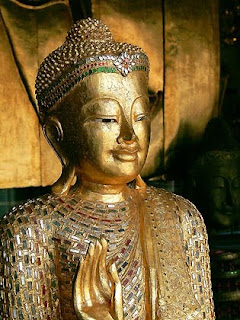The Concept Of Applied Buddhism
Published by kilwar under buddha, buddhism, buddhist, buddhist concept, buddhist teachings, direct buddhism, science, spiritual on 3:01 AM
Introduction:
"Applied Buddhism" is the application of Buddhist teachings in our daily life. It is a broad umbrella under which all the essential aspects of life such as physical, mental, social and spiritual well being as well as philosophical, bio-ethical, financial and modern scientific aspects could be incorporated. This includes the Buddhist ideas practiced by the three major schools of Buddhist thoughts in modern era, namely the Theravada, Mahayana and Tantrayana (Tibetan) traditions. Apart from the commonly discussed philosophical and psychological aspects, more emphasis is given here on the traditional culture and social aspects of Buddhism.
"Applied Buddhism" also shares valuable information on Buddhist contributions to modern science, health and well being. As our concept of well being is directly related to our mental and spiritual health, Buddhist Meditational practices are given the prime importance for prevention of mental illnesses and recommended for incorporation in the regimen of regular psychotherapy and in primary and secondary school curriculum as a part of primordial prevention.
Importance of Applied Buddhism
Without disrespecting the significance of religious rituals, the myths and beliefs and traditional local ceremonial practices related to Buddhism are however, carefully extracted and excluded from this domain of "Applied Buddhism". This is intentionally done in order to make the Buddhist ideas more acceptable to people belonging other religious realms and cultural backgrounds. The idea behind this is to enable people practice Buddhism without being converted into a Buddhist. One should understand that Buddhism is not just a religion, but a way of life.
In order to incorporate Buddhist ideas in daily life, one need not give up his or her own religion. Just that one can remain spiritual without being religious, in the same way; one can practice Buddhist teachings without formally being a Buddhist.
Applied Aspect of Buddhism: Integration of Buddhist Philosophy with Activities in Daily Life
Thus, the term "Applied Buddhism" explains how every person can relate Buddhist ideas into his or her daily life and in profession. The main focus of this new concept is to diffuse the teachings of the Buddha in every nook and corner of the society, so that all sentient beings, irrespective of their religion, culture and creed can benefit from it. In recent times, some of the new concepts that have evolved in Buddhism are Engaged Buddhism, Social Buddhism, Socially Engaged Buddhism and Green Buddhism. Like the "String Theory" of quantum physics, "Applied Buddhism" is an effort to integrate all these scattered aspects of Buddhism under one single and unified concept in order to make it more appealing to the global community. Through this Applied Buddhism, one should be able to follow Buddhism without being a Buddhist.
Evolution of the Concept of Applied Buddhism
The term "Applied Buddhism" was first coined by an eminent Buddhist Scholar from India, Dr. Dipak Kumar Barua. He was the elected Dean of the Faculty Council for Postgraduate Studies in Education, Journalism & Library Science in the University of Calcutta, West Bengal, India (1987-1991) and the Director of Nava Nalanda Mahavihara, Nalanda (a Deemed University) in Nalanda, Bihar, India (1996-1999). He had discussed at length about this new concept of "Applied Buddhism" in his Book entitled, "Applied Buddhism: Studies in the Gospel of Buddha from Modern Perspectives".
This book was first published during the year 2005 by the Centre of Buddhist Studies, under the aegis of the Department of Pali and Buddhist Studies of the Banaras Hindu University in India. However, due to limited publications and restricted circulation of this book within the country, the new concept of "Applied Buddhism" could not be popularized outside India for quite some time. However, during the later years, this new concept was widely appreciated by the renowned scholars in various intellectual forums throughout the world. The common people from varied religious background also found comfort in easy understanding of the principle teachings of the Buddha.
Conclusion
This new concept of the applied aspect of Buddhism is destined to bridge the gap of understanding that exists due to misinterpretation of the teachings of the Buddha by people belonging to diverse religious backgrounds. Once popularized and accepted, it would pave the way in promoting peace and harmony in the society. Applied Buddhism is also a noble endeavor to integrate the Buddhist philosophy with modern science and technology. This applied philosophy is an integral part of our daily life and is expected to be accepted by everyone without any discrimination.
I am Dr. Ankur Barua from India. I had graduated from the Manipal University in India (MBBS-2000, MD in Community Medicine - 2003). I had also completed two other Master Degrees; one from Sikkim Manipal University (MBAIT, 2007) and the other from the University of Hong Kong (MBuddStud, 2009), which I had passed with distinction. I am currently enrolled as a final year PhD candidate in Community Medicine at the Sikkim Manipal University of India and also in Buddhist Studies at the Lumbini Buddha University of Nepal.
I am included in the reviewers' list of the international journals such as 'Bulletin of the World Health Organization', 'International Psychogeriatrics' and 'Journal of Neuroscience and Behavioural Health'. I had received the esteemed "Tung Lin Kok Yuen Postgraduate Scholarship in Buddhist Studies during the year 2008-2009" by the Li ka Shing Foundation of the Centre of Buddhist Studies of the University of Hong Kong. I had received the prestigious "2007 Leelabati Bholanath Award for Research in Community Psychiatry" for the original research article entitled, "Depressive Disorders in Indian Elderly Population".
Article Source: http://EzineArticles.com/?expert=Ankur_Barua
0 comments:
Post a Comment